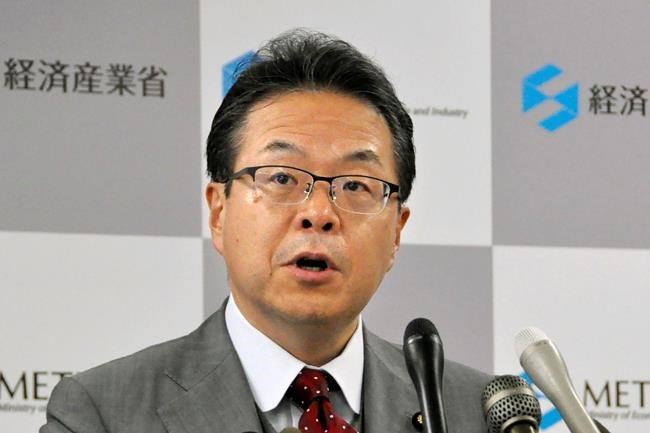
In this Sept. 3, 2019, photo, Japan's Minister of Economy, Trade and Industry Hiroshige Seko speaks during a press conference at his ministry after a cabinet meeting in Tokyo. Seko told reporters Wednesday, Sept. 11, 2019, he thought hardly any World Trade Organization member countries were sympathetic to South Korea's position. "Regardless, it is clear that our action is consistent with the WTO," he said. South Korea said it will initiate a complaint to the WTO over Japan's tightened export controls on key materials South Korean companies use to make computer chips and displays. (Mari Tokumitsu/Kyodo News via AP)
Republished September 10, 2019 - 8:38 PM
Original Publication Date September 10, 2019 - 8:06 PM
SEOUL, Korea, Republic Of - South Korea said it will initiate a complaint Wednesday to the World Trade Organization over Japan's tightened export controls on key materials South Korean companies use to make computer chips and displays
Seoul accused Tokyo of weaponizing trade to retaliate over political rows. It will formally request bilateral consultations with Japan on Wednesday as the first step in the WTO dispute settlement process, said Yoo Myung-hee, a senior official at South Korea's Ministry of Trade, Industry and Energy.
Japan in July imposed tighter export controls on three chemicals South Korean companies use to produce semiconductors and displays for smartphones and TVs, citing unspecified security concerns over South Korea's export controls on sensitive materials that could be used for military purposes.
The measures, which weeks later were followed by Japan's move to exclude South Korea from its "white list" of countries with fast-track trade status, triggered a full-blown diplomatic row that saw relations sink to a low unseen in decades
South Korea says Japan's trade measures threaten its export-dependent economy, where many manufacturers rely on materials and parts imported from Japan. It claims Tokyo is retaliating over South Korean court rulings that called for Japanese companies to offer reparations to aging South Korean plaintiffs over World War II forced labour.
"Japan's export restriction on the three materials were based on political motivation related to rulings by our Supreme Court on forced labour ... It was a discriminatory measure that directly targets only our country," Yoo said in a news conference.
Hiroshige Seko, Japan's minister of economy, trade and industry, told reporters in Tokyo he thought hardly any WTO member countries were sympathetic to South Korea's position. "Regardless, it is clear that our action is consistent with the WTO," he said. Seko added that Tokyo would study the demands and respond according to the proper WTO procedures.
If Japan accepts South Korea's request, the countries must hold consultations for a minimum 60 days. If Japan refuses the consultations or if the talks fail, South Korea could request a WTO panel ruling on the dispute. The process usually takes about 15 months but may also last years, said Jeong Hae-seong, a South Korean trade ministry official.
Yoo said the country is also considering whether to pursue WTO action over Japan's move to delist South Korea as a preferential trade partner.
News from © The Associated Press, 2019